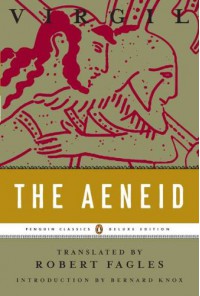The Aeneid

Virgil, you shameless shameless flatterer who clearly paid VERY close attention to Homer's writing (a bit TOO close, in some places). "The Aeneid", in its sadly incomplete form of only 12 books out of the 40 Virgil planned on writing, is very much a sandwich, dare I say even "fan fiction"-like, version of the Odyssey and the Illiad. Considering that I enjoyed only one of those two (I'm still trying to force my way through the Illiad), it's no surprise that the first six books I thought were wonderful, whereas the remaining six were almost painful to get through.
Our TA asked us today during class how we can interpret "The Aeneid" in relation to what's going on right now politically, and when no one said anything she rephrased it by asking us what we think the point is in reading literature at a time when fascism is rising all around us. It was disheartening to see almost all my classmates laugh at this question, for there is quite a bit that can be taken out and looked at in this book, particularly the trope of destiny and glory of future Rome which Aeneas pursues, and the role which women occupy in this general narrative. It's amazing to see how cyclical history really is, and how things may change slightly in terms of details while the overarching ideas and themes remain the same. It's why reading classics is still pertinent, to remind us that just like we still don't know how to necessarily interpret a text that's been written centuries ago, we also don't know how to react to the present in its immediacy.
 2
2
 1
1





